韩素音青翻译奖赛中文原文及参考译文和解析
第十七届“韩素音青年翻译奖”赛中文原文及参考译文和解析
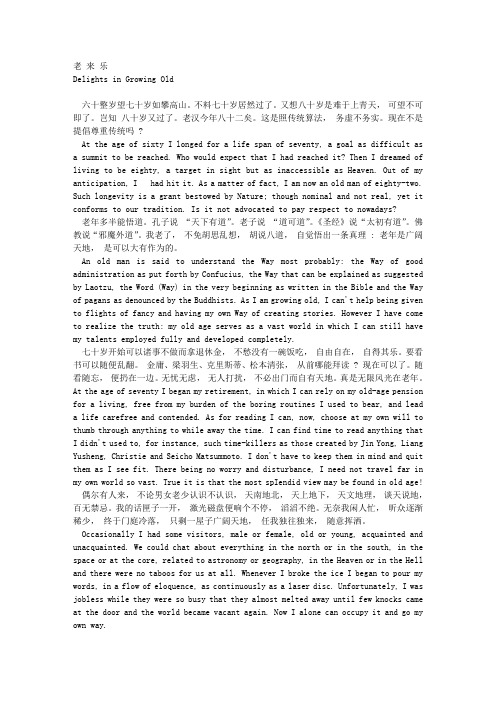
老来乐Delights in Growing Old六十整岁望七十岁如攀高山。
不料七十岁居然过了。
又想八十岁是难于上青天,可望不可即了。
岂知八十岁又过了。
老汉今年八十二矣。
这是照传统算法,务虚不务实。
现在不是提倡尊重传统吗 ?At the age of sixty I longed for a life span of seventy, a goal as difficult as a summit to be reached. Who would expect that I had reached it? Then I dreamed of living to be eighty, a target in sight but as inaccessible as Heaven. Out of my anticipation, I had hit it. As a matter of fact, I am now an old man of eighty-two. Such longevity is a grant bestowed by Nature; though nominal and not real, yet it conforms to our tradition. Is it not advocated to pay respect to nowadays?老年多半能悟道。
孔子说“天下有道”。
老子说“道可道”。
《圣经》说“太初有道”。
佛教说“邪魔外道”。
我老了,不免胡思乱想,胡说八道,自觉悟出一条真理 : 老年是广阔天地,是可以大有作为的。
An old man is said to understand the Way most probably: the Way of good administration as put forth by Confucius, the Way that can be explained as suggested by Laotzu, the Word (Way) in the very beginning as written in the Bible and the Way of pagans as denounced by the Buddhists. As I am growing old, I can't help being given to flights of fancy and having my own Way of creating stories. However I have come to realize the truth: my old age serves as a vast world in which I can still have my talents employed fully and developed completely.七十岁开始可以诸事不做而拿退休金,不愁没有一碗饭吃,自由自在,自得其乐。
第4届韩素音青年翻译比赛英译汉原文及参考译文
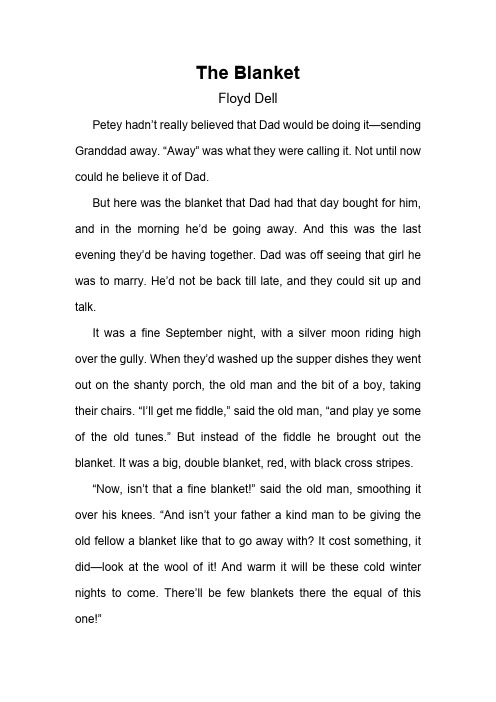
The BlanketFloyd DellPetey hadn’t really believed that Dad would be doing it—sending Granddad away. “Away” was what they were calling it. Not until now could he believe it of Dad.But here was the blanket that Dad had that day bought for him, and in the morning he’d be going away. And this was the last evening they’d be having together. Dad was off seeing that girl he was to marry. He’d not be back till late, and they could sit up and talk.It was a fine September night, with a silver moon riding high over the gully. When they’d washed up the supper dishes they went out on the shanty porch, the old man and the bit of a boy, taking their chairs. “I’ll get me fiddle,” said the old man, “and play ye some of the old tunes.” But instead of the fiddle he brought out the blanket. It was a big, double blanket, red, with black cross stripes.“Now, isn’t that a fine blanket!” said the old man, smoothing it over his knees. “And isn’t your father a kind man to be giving the old fellow a blanket like that to go away with? It cost something, it did—look at the wool of it! And warm it will be these cold winter nights to come. There’ll be few blankets there the equal of this one!”It was like Granddad to be saying that. He was trying to make it easier. He’d pretended all along it was he that wanting to go away to the great brick building—the government place, where he’d be with so many other old fellows having the best of everything.... But Petey hadn’t believed Dad would really do it, until this night when he brought home the blanket.“Oh, yes, it’s a fine blanket,” said Petey, and got up and went into the shanty. He wasn’t the kind to cry, and, besides, he was too old for that, being eleven. He’d just come in to fetch Granddad’s fiddle.The blanket slid to the floor as the old man took the fiddle and stood up. It was the last night they’d be having together. There wasn’t any need to say, “Play all the old tunes.” Granddad tuned up for a minute, and then said, “This is one you’ll like to remember.”The silver moon was high overhead, and there was a gentle breeze playing down the gully. He’d never be hearing Granddad play like this again. It was as well Dad was moving into that new house, away from here. He’d not want, Petey wouldn’t, to sit here on the old porch of fine evenings, with Granddad gone.The tune changed. “Here’s something gayer.” Petey sat and stared out over the gully. Dad would marry that girl. Yes, that girl who’d kissed him and slobbered over him, saying she’d try to be agood mother to him, and all.... His chair creaked as he involuntarily gave his body a painful twist.The tune stopped suddenly, and Granddad said: “It’s a poor tune, except to be dancing to.” And then: “It’s a fine girl your father’s going to marry. He’ll be feeling young again, with a pretty wife like that. And what would an old fellow like me be doing around their house, getting in the way, an old nuisance, what with my talk of aches and pains! And then there’ll be babies coming, and I’d not want to be there to hear them crying at all hours. It’s best that I take myself off, like I’m doing. One more tune or two, and then we’ll be going to bed to get some sleep against the morning, when I’ll pack up my fine blanket and take my leave. Listen to this, will you? It’s a bit sad, but a fine tune for a night like this.”They didn’t hear the two people coming down the gully path, Dad and the pretty girl with the hard, bright face like a china doll’s. but they heard her laugh, right by the porch, and the tune stopped on a wrong, high, startled note. Dad didn’t say anything, but the girl came forward and spoke to Granddad prettily: “I’ll not be seeing you leave in the morning, so I came over to say good-by.”“It’s kind of you,” said Granddad, with his eyes cast down; and then, seeing the blanket at his feet, he stopped to pick it up. “Andwill you look at this,” he said in embarrassment, “the fine blanket my son has given me to go away with!”“Yes,” she said, “it’s a fine blanket.” She felt of the wool, and repeated in surprise, “A fine blanket—I’ll say it is!” She turned to Dad, and said to him coldly, “it cost something, that.”He cleared his throat, and said defensively, “I wanted him to have the best...”The girl stood there, still intent on the blanket. “It’s double, too,” she said reproachfully to Dad.“Yes,” said Granddad, “it’s double—a fine blanket for an old fellow to be going away with.”The boy went abruptly into the shanty. He was looking for something. He could hear that girl reproaching Dad, and Dad becoming angry in his slow way. And now she was suddenly going away in a huff.... As Petey came out, she turned and called back, “All the same, he doesn’t need a double blanket!” And she ran up the gully path.Dad was looking after her uncertainly.“Oh, she’s right,” said the boy coldly. “Here, Dad”—and he held out a pair of scissors. “Cut the blanket in two.”Both of them stared at the boy, startled. “Cut it in two, I tell you, Dad!” he cried out. “And keep the other half!”“That’s not a bad idea,” said Granddad gently. “I don’t need so much of a blanket.”“Yes,” said the boy harshly, “a single blanket is enough for an old man when he’s sent away. We’ll save the other half, Dad; it will come in handy later.”“Now, what do you mean by that?” asked Dad.“I mean,” said the boy slowly,” that I’ll give it to you, Dad—when you’re old and I’m sending you—away.”There was a silence, and then Dad went over to Granddad and stood before him, not speaking. But Granddad understood, for he put out a hand and laid it on Dad’s shoulder. Petey was watching them. And he heard Granddad whisper, “It’s all right, son—I knew you didn’t mean it....” And then Petey cried.But it didn’t matter—because they were all three crying together.译文:一床双人毛毯(美)弗罗伊德•戴尔晴朗的九月的夜晚,银色的月光洒落在溪谷上。
第二十六届“韩素音青年翻译奖”竞赛原文
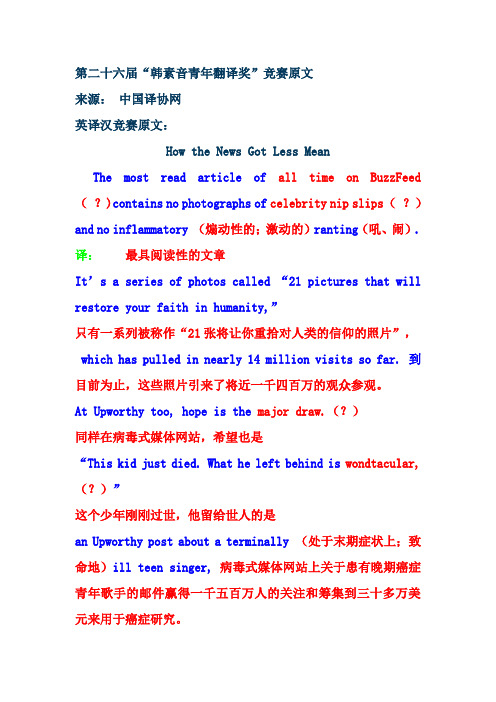
第二十六届“韩素音青年翻译奖”竞赛原文来源:中国译协网英译汉竞赛原文:How the News Got Less MeanThe most read article of all time on BuzzFeed (?)contains no photographs of celebrity nip slips(?)and no inflammatory (煽动性的;激动的)ranting(吼、闹). 译:最具阅读性的文章It’s a series of photos called “21 pictures that will restore your faith in humanity,”只有一系列被称作“21张将让你重拾对人类的信仰的照片”, which has pulled in nearly 14 million visits so far. 到目前为止,这些照片引来了将近一千四百万的观众参观。
At Upworthy too, hope is the major draw.(?)同样在病毒式媒体网站,希望也是“This kid just died. What he left behind is wondtacular,(?)”这个少年刚刚过世,他留给世人的是an Upworthy post about a terminally (处于末期症状上;致命地)ill teen singer, 病毒式媒体网站上关于患有晚期癌症青年歌手的邮件赢得一千五百万人的关注和筹集到三十多万美元来用于癌症研究。
earned 15 million views this summer and has raised more than $300,000 for cancer research.The recipe for attracting visitors to stories online is changing.网上吸引观众关注故事的秘诀正发生改变。
第十七届“韩素音青年翻译奖”赛(汉译英)中文原文及参考译文和解析
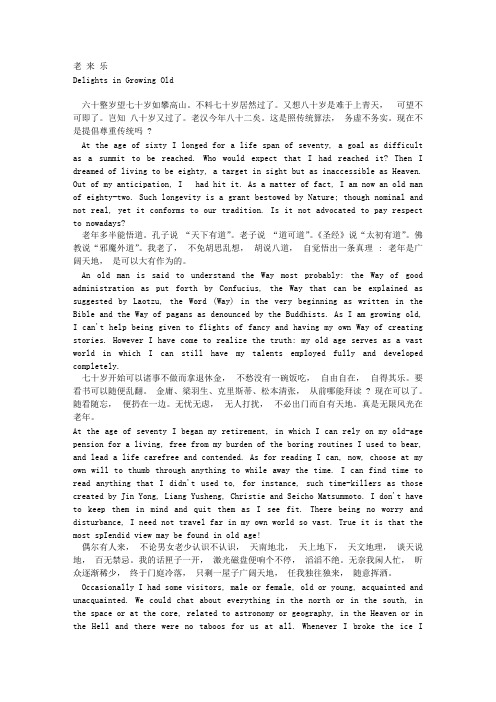
老来乐Delights in Growing Old六十整岁望七十岁如攀高山。
不料七十岁居然过了。
又想八十岁是难于上青天,可望不可即了。
岂知八十岁又过了。
老汉今年八十二矣。
这是照传统算法,务虚不务实。
现在不是提倡尊重传统吗 ?At the age of sixty I longed for a life span of seventy, a goal as difficult as a summit to be reached. Who would expect that I had reached it? Then I dreamed of living to be eighty, a target in sight but as inaccessible as Heaven. Out of my anticipation, I had hit it. As a matter of fact, I am now an old man of eighty-two. Such longevity is a grant bestowed by Nature; though nominal and not real, yet it conforms to our tradition. Is it not advocated to pay respect to nowadays?老年多半能悟道。
孔子说 “天下有道”。
老子说 “道可道”。
《圣经》说“太初有道”。
佛教说“邪魔外道”。
我老了,不免胡思乱想,胡说八道,自觉悟出一条真理 : 老年是广阔天地,是可以大有作为的。
An old man is said to understand the Way most probably: the Way of good administration as put forth by Confucius, the Way that can be explained as suggested by Laotzu, the Word (Way) in the very beginning as written in the Bible and the Way of pagans as denounced by the Buddhists. As I am growing old, I can't help being given to flights of fancy and having my own Way of creating stories. However I have come to realize the truth: my old age serves as a vast world in which I can still have my talents employed fully and developed completely.七十岁开始可以诸事不做而拿退休金,不愁没有一碗饭吃,自由自在,自得其乐。
第23届韩素音青年翻译奖竞赛汉译英原文
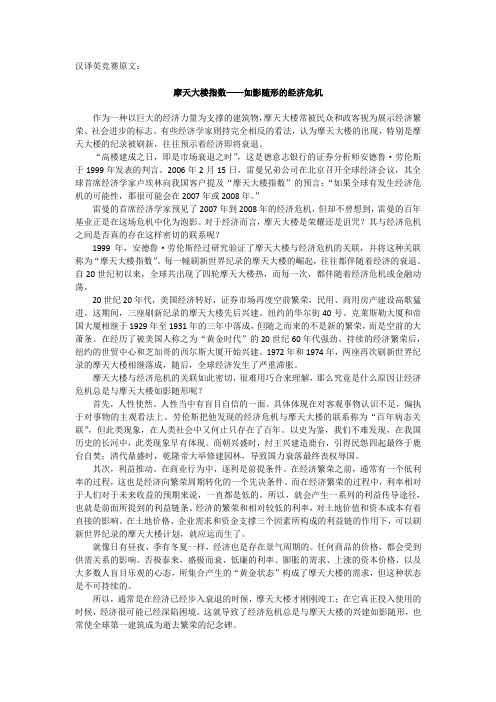
汉译英竞赛原文:摩天大楼指数——如影随形的经济危机作为一种以巨大的经济力量为支撑的建筑物,摩天大楼常被民众和政客视为展示经济繁荣、社会进步的标志。
有些经济学家则持完全相反的看法,认为摩天大楼的出现,特别是摩天大楼的纪录被刷新,往往预示着经济即将衰退。
“高楼建成之日,即是市场衰退之时”,这是德意志银行的证券分析师安德鲁·劳伦斯于1999年发表的判言。
2006年2月15日,雷曼兄弟公司在北京召开全球经济会议,其全球首席经济学家卢埃林向我国客户提及“摩天大楼指数”的预言:“如果全球有发生经济危机的可能性,那很可能会在2007年或2008年。
”雷曼的首席经济学家预见了2007年到2008年的经济危机,但却不曾想到,雷曼的百年基业正是在这场危机中化为泡影。
对于经济而言,摩天大楼是荣耀还是诅咒?其与经济危机之间是否真的存在这样密切的联系呢?1999年,安德鲁·劳伦斯经过研究验证了摩天大楼与经济危机的关联,并将这种关联称为“摩天大楼指数”。
每一幢刷新世界纪录的摩天大楼的崛起,往往都伴随着经济的衰退。
自20世纪初以来,全球共出现了四轮摩天大楼热,而每一次,都伴随着经济危机或金融动荡。
20世纪20年代,美国经济转好,证券市场再度空前繁荣,民用、商用房产建设高歌猛进。
这期间,三座刷新纪录的摩天大楼先后兴建。
纽约的华尔街40号、克莱斯勒大厦和帝国大厦相继于1929年至1931年的三年中落成,但随之而来的不是新的繁荣,而是空前的大萧条。
在经历了被美国人称之为“黄金时代”的20世纪60年代强劲、持续的经济繁荣后,纽约的世贸中心和芝加哥的西尔斯大厦开始兴建。
1972年和1974年,两座再次刷新世界纪录的摩天大楼相继落成,随后,全球经济发生了严重滞胀。
摩天大楼与经济危机的关联如此密切,很难用巧合来理解,那么究竟是什么原因让经济危机总是与摩天大楼如影随形呢?首先,人性使然。
人性当中有盲目自信的一面。
具体体现在对客观事物认识不足,偏执于对事物的主观看法上。
第二十二届韩素音青年翻译奖竟赛英译汉译文和译文评析

英译汉Hidden Within Technology’s Empire, a Republic of Letters隐藏于技术帝国的文学界索尔•贝妻When I was a boy “discovering literature”, I used to think how wonderful it would be if every other person on the street were familiar with Proust and Joyce or T. E. Lawrence or Pasternak and Kafka. Later I learned how refractory to high culture the democratic masses were. Lincoln as a young frontiersman read Plutarch, Shakespeare and the Bible. But then he was Lincoln.我还是个"探索文学"的少年时,就经常在想:要是大街上人人都熟悉普鲁斯特和乔伊斯,熟悉T.E.劳伦斯,熟悉帕斯捷尔纳克和卡夫卡,该有多好啊!后来才知道,平民百姓对高雅文化有多排斥。
虽说少年时代身居边陲的林肯就在阅读普鲁塔克,、莎士比亚和《圣经》,但他毕竟是林肯。
Later when I was traveling in the Midwest by car, bus and train, I regularly visited small-town libraries and found that readers in Keokuk, Iowa, or Benton Harbor, Mich., were checking out Proust and Joyce and even Svevo and Andrei Biely. D. H. Lawrence was also a favorite. And sometimes I remembered that God was willing to spare Sodom for the sake of 10 of the righteous. Not that Keokuk was anything like wicked Sodom, or that Proust’s Charlus would have been tempted to settle in Benton Harbor, Mich. I seem to have had a persistent democratic desire to find evidences of high culture in the most unlikely places.后来,我坐小车、巴士和火车在中西部旅行,经常走访小镇图书馆;发现在衣阿华州基奥卡克市,或者密歇根州本顿港市,读者们借阅普鲁斯特和乔伊斯的作品,甚至还有斯维沃@和安德烈•别雷®的著作。
第23届韩素音青年翻译奖竞赛英译汉原文

英译汉竞赛原文:Are We There Yet?America’s recovery will be much slower than that from most recessions; but the governmentcan help a bit.“WHITHER goest thou, America?” That question, posed by Jack Kerouac on behalf of the Beat generation half a century ago, is the biggest uncertainty hanging over the world economy. And it reflects the foremost worry for American voters, who go to the polls for the congressional mid-term elections on November 2nd with the country’s unemployment rate stubbornly stuck at nearly one in ten. They should prepare themselves for a long, hard ride.The most wrenching recession since the 1930s ended a year ago. But the recovery—none too powerful to begin with—slowed sharply earlier this year. GDP grew by a feeble 1.6% at an annual pace in the second quarter, and seems to have been stuck somewhere similar since. The housing market slumped after temporary tax incentives to buy a home expired. So few private jobs were being created that unemployment looked more likely to rise than fall. Fears grew over the summer that if this deceleration continued, America’s economy would slip back into recession.Fortunately, those worries now seem exaggerated. Part of the weakness of second-quarter GDP was probably because of a temporary surge in imports from China. The latest statistics, from reasonably good retail sales in August to falling claims for unemployment benefits, point to an economy that, though still weak, is not slumping further. And history suggests that although nascent recoveries often wobble for a quarter or two, they rarely relapse into recession. For now, it is most likely that America’s economy will crawl along with growth at perhaps 2.5%: above stall speed, but far too slow to make much difference to the jobless rate.Why, given th at America usually rebounds from recession, are the prospects so bleak? That’s because most past recessions have been caused by tight monetary policy. When policy is loosened, demand rebounds. This recession was the result of a financial crisis. Recoveries after financial crises are normally weak and slow as banking systems are repaired and balance-sheets rebuilt. Typically, this period of debt reduction lasts around seven years, which means America would emerge from it in 2014. By some measures, households are reducing their debt burdens unusually fast, but even optimistic seers do not think the process is much more than half over.Battling on the busAmerica’s biggest problem is that its politicians have yet to acknowledge that the economy is in for such a long, slow haul, let alone prepare for the consequences. A few brave officials are beginning to sound warnings that the jobless rate is likely to “stay high”. But the political debate is more about assigning blame for the recession than about suggesting imaginative ways to give more oomph to the recovery.Republicans argue that Barack Obama’s shift towards “big government” explains the economy’s weakness, and that high unemployment is proof that fiscal stimulus was a bad idea. In fact, most of the growth in government to date has been temporary and unavoidable; the longer-run growth in government is more modest, and reflects the policies of both Mr Obama andhis predecessor. And the notion that high joblessness “proves” that stimulus failed is simply wron g. The mechanics of a financial bust suggest that without a fiscal boost the recession would have been much worse.Democrats have their own class-warfare version of the blame game, in which Wall Street’s excesses caused the problem and higher taxes on high-earners are part of the solution. That is why Mr. Obama’s legislative priority before the mid-terms is to ensure that the Bush tax cuts expire at the end of this year for households earning more than $250,000 but are extended for everyone else.This takes an unnecessary risk with the short-term recovery. America’s experience in 1937 and Japan’s in 1997 are powerful evidence that ill-timed tax rises can tip weak economies back into recession. Higher taxes at the top, along with the waning of fiscal stimulus and belt-tightening by the states, will make a weak growth rate weaker still. Less noticed is that Mr. Obama’s fiscal plan will also worsen the medium-term budget mess, by making tax cuts for the middle class permanent.Ways to overhaul the engineIn an ideal world America would commit itself now to the medium-term tax reforms and spending cuts needed to get a grip on the budget, while leaving room to keep fiscal policy loose for the moment. But in febrile, partisan Washington that is a pipe-dream. Today’s goals can only be more modest: to nurture the weak economy, minimize uncertainty and prepare the ground for tomorrow’s fiscal debate. To that end, Congress ought to extend all the Bush tax cuts until 2013. Then they should all expire—prompting a serious fiscal overhaul, at a time when the economy is stronger.A broader set of policies could help to work off the hangover faster. One priority is to encourage more write-downs of mortgage debt. Almost a quarter of all Americans with mortgages owe more than their houses are worth. Until that changes the vicious cycle of rising foreclosures and falling prices will continue. There are plenty of ideas on offer, from changing the bankruptcy law so that judges can restructure mortgage debt to empowering special trustees to write down loans. They all have drawbacks, but a fetid pool of underwater mortgages will, much like Japan’s loans to zombie firms, corrode the financial system and harm the recovery.Cleaning up the housing market would help cut America’s unemploy ment rate, by making it easier for people to move to where jobs are. But more must be done to stop high joblessness becoming entrenched. Payroll-tax cuts and credits to reduce the cost of hiring would help. (The health-care reform, alas, does the opposite, at least for small businesses.) Politicians will also have to think harder about training schemes, because some workers lack the skills that new jobs require.Americans are used to great distances. The sooner they, and their politicians, accept that the road to recovery will be a long one, the faster they will get there.。
第22届韩素音翻译大赛 英译汉 参考译文
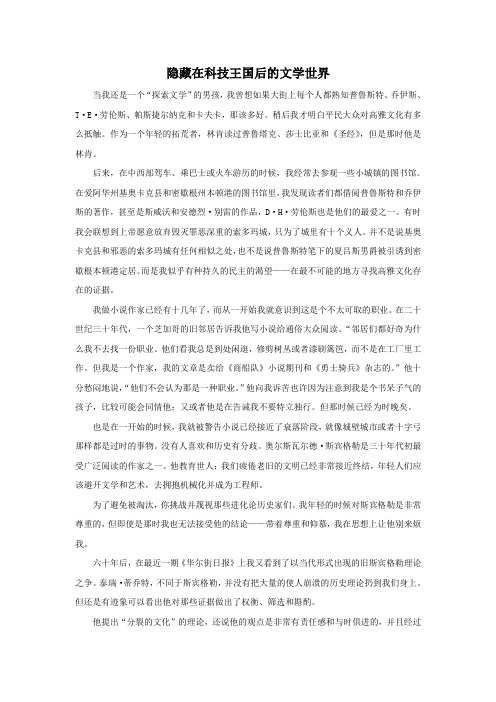
隐藏在科技王国后的文学世界当我还是一个“探索文学”的男孩,我曾想如果大街上每个人都熟知普鲁斯特、乔伊斯、T·E·劳伦斯、帕斯捷尔纳克和卡夫卡,那该多好。
稍后我才明白平民大众对高雅文化有多么抵触。
作为一个年轻的拓荒者,林肯读过普鲁塔克、莎士比亚和《圣经》,但是那时他是林肯。
后来,在中西部驾车、乘巴士或火车游历的时候,我经常去参观一些小城镇的图书馆。
在爱阿华州基奥卡克县和密歇根州本顿港的图书馆里,我发现读者们都借阅普鲁斯特和乔伊斯的著作,甚至是斯威沃和安德烈·别雷的作品,D·H·劳伦斯也是他们的最爱之一。
有时我会联想到上帝愿意放弃毁灭罪恶深重的索多玛城,只为了城里有十个义人。
并不是说基奥卡克县和邪恶的索多玛城有任何相似之处,也不是说普鲁斯特笔下的夏吕斯男爵被引诱到密歇根本顿港定居。
而是我似乎有种持久的民主的渴望——在最不可能的地方寻找高雅文化存在的证据。
我做小说作家已经有十几年了,而从一开始我就意识到这是个不太可取的职业。
在二十世纪三十年代,一个芝加哥的旧邻居告诉我他写小说给通俗大众阅读。
“邻居们都好奇为什么我不去找一份职业。
他们看我总是到处闲逛,修剪树丛或者漆刷篱笆,而不是在工厂里工作。
但我是一个作家,我的文章是卖给《商船队》小说期刊和《勇士骑兵》杂志的。
”他十分愁闷地说,“他们不会认为那是一种职业。
”他向我诉苦也许因为注意到我是个书呆子气的孩子,比较可能会同情他;又或者他是在告诫我不要特立独行。
但那时候已经为时晚矣。
也是在一开始的时候,我就被警告小说已经接近了衰落阶段,就像城壁城市或者十字弓那样都是过时的事物。
没有人喜欢和历史有分歧。
奥尔斯瓦尔德·斯宾格勒是三十年代初最受广泛阅读的作家之一。
他教育世人:我们疲倦老旧的文明已经非常接近终结,年轻人们应该避开文学和艺术,去拥抱机械化并成为工程师。
为了避免被淘汰,你挑战并蔑视那些进化论历史家们。
- 1、下载文档前请自行甄别文档内容的完整性,平台不提供额外的编辑、内容补充、找答案等附加服务。
- 2、"仅部分预览"的文档,不可在线预览部分如存在完整性等问题,可反馈申请退款(可完整预览的文档不适用该条件!)。
- 3、如文档侵犯您的权益,请联系客服反馈,我们会尽快为您处理(人工客服工作时间:9:00-18:30)。
老来乐Delights in Growing Old六十整岁望七十岁如攀高山。
不料七十岁居然过了。
又想八十岁是难于上青天,可望不可即了。
岂知八十岁又过了。
老汉今年八十二矣。
这是照传统算法,务虚不务实。
现在不是提倡尊重传统吗?At the age of sixty I longed for a life span of seventy, a goal as difficult as a summit to be reached. Who would expect that I had reached it? Then I dreamed of living to be eighty, a target in sight but as inaccessible as Heaven. Out of my anticipation, I had hit it. As a matter of fact, I am now an old man of eighty-two. Such longevity is a grant bestowed by Nature; though nominal and not real, yet it conforms to our tradition. Is it not advocated to pay respect to nowadays?老年多半能悟道。
孔子说“天下有道”。
老子说“道可道”。
《圣经》说“太初有道”。
佛教说“邪魔外道”。
我老了,不免胡思乱想,胡说八道,自觉悟出一条真理: 老年是广阔天地,是可以大有作为的。
An old man is said to understand the Way most probably: the Way of good administration as put forth by Confucius, the Way that can be explained as suggested by Laotzu, the Word (Way) in the very beginning as written in the Bible and the Way of pagans as denounced by theBuddhists. As I am growing old, I can't help being given to flights of fancy and having my own Way of creating stories. However I have come to realize the truth: my old age serves as a vast world in which I can still have my talents employed fully and developed completely.七十岁开始可以诸事不做而拿退休金,不愁没有一碗饭吃,自由自在,自得其乐。
要看书可以随便乱翻。
金庸、梁羽生、克里斯蒂、松本清张,从前哪能拜读? 现在可以了。
随看随忘,便扔在一边。
无忧无虑,无人打扰,不必出门而自有天地。
真是无限风光在老年。
At the age of seventy I began my retirement, in which I can rely on my old-age pension for a living, free from my burden of the boring routines I used to bear, and lead a life carefree and contended. As for reading I can, now, choose at my own will to thumb through anything to while away the time. I can find time to read anything that I didn't used to, for instance, such time-killers as those created by Jin Yong, Liang Yusheng, Christie and Seicho Matsummoto. I don't have to keep them in mind and quit them as I see fit. There being no worry and disturbance, I need not travel far in my own world so vast. True it is that the most spIendid view may be found in old age!偶尔有人来,不论男女老少认识不认识,天南地北,天上地下,天文地理,谈天说地,百无禁忌。
我的话匣子一开,激光磁盘便响个不停,滔滔不绝。
无奈我闲人忙,昕众逐渐稀少,终于门庭冷落,只剩一屋子广阔天地,任我独往独来,随意挥洒。
Occasionally I had some visitors, male or female, old or young, acquainted and unacquainted. We could chat about everything in the north or in the south, in the space or at the core, related to astronomy or geography, in the Heaven or in the Hell and there were no taboos for us at all. Whenever I broke the ice I began to pour my words, in a flow of eloquence, as continuously as a laser disc. Unfortunately, I was jobless while they were so busy that they almost melted away until few knocks came at the door and the world became vacant again. Now I alone can occupy it and go my own way.打开电视,又是一番新气象。
古今中外,赤道南极,变幻莫测。
真能坐地日行八万里。
忽而庄严说教,忽而插科打浑,忽而高歌一曲,忽而舞步翩翩。
帝王将相,牛鬼蛇神,无不具备,应有尽有,场面各有不同。
主持人个个精神焕发。
服装表演件件花样翻新。
足球射门中的。
篮球投篮不空。
马家军飒爽英姿。
大歌星真人假唱。
忽然出现红顶花翎,拖着辫子,仿佛我的一百四十岁的父亲复活。
他不辞辛苦跑到北京来对宣统皇帝磕头。
我却曾在大庭广众中对溥仪先生点头问好。
真是一代不如一代,一代胜过一代。
正在得意之间,不料长袍马褂已变成西装革履。
长发长袜,飘来跳去,三点泳装耀眼生辉。
眼睛耳朵实在招架不住,那就下令暂停,闭目养神去也。
这正是:小屋之中天地阔老年无事是忙人。
When I turn on the TV set, some other new scenes come into my sight, for example, the changeable events in history or in current affaires, on the equator or at the poles. It might be said that while sitting in my room I can cover eighty thousand miles a day since our planet spins. Come upon the screen, now serious preaches, now comic gestures and remarks, now resounding songs, now twists and dances. The cast may be emperors, generals, monsters or demons, of all kinds and of all sorts, but in different situations. Every host beams with vigor and energy, as a model girl shows a brand new costume, as a goal is made in a football game, as each shot scores the basket, as a distance- race runner on the team coached by Mr. Ma makes a good performance or as a famous star comes on the stage in person but his /her song comes from the cassette. Suddenly the picture changes as an official in a red-topped hat and with a pigtail behind the back comes upon the scene, as if my 140-year-old father had come to life again. He made light of a tiring travel from my hometown to the capital in order to kowtow to the emperor Xuantong. In contrast, I did once meet with and greet Mr. Pu Yi, the same person, in public. Really, a new generation may be inferior to the old and in turn an old generation may be outshone by the new. As I am beside myself in high glee, the traditional costume gives way to a western suit. Then the long-haired and the long-stocked shake their legs as if adrift,sandwiched by the radiating bikinied. My eyes and ears can hardly stand those things and I order the set to be turned off for I am going to close my eyes for a rest. So it is well said:The world is vast though in the house very small;The old become jobless, yet now most active of all.——第十七届" 韩素音青年翻译奖" 汉译英参赛译文评析第十七届" 韩素音青年翻译奖" 汉译英部分评选工作已顺利完成。
